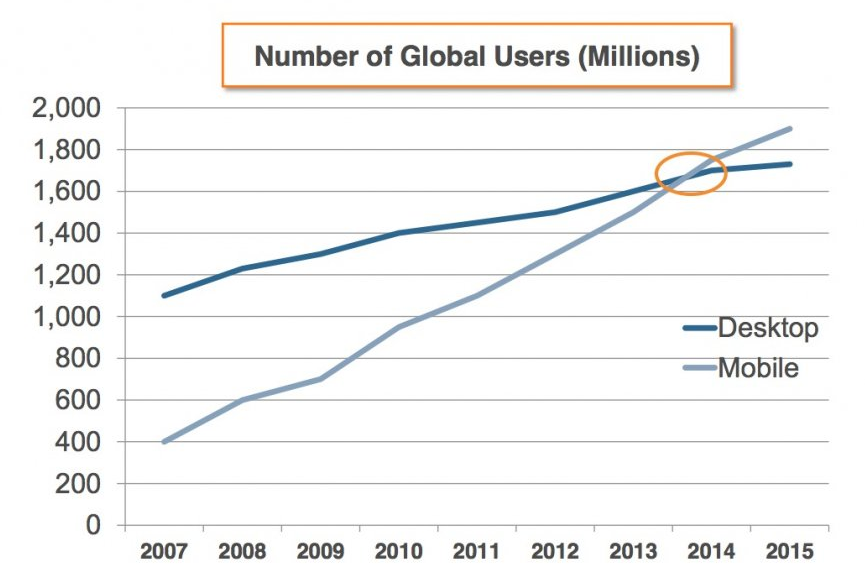Each passing year brings along some trends in our marketing efforts. While some stick out another year, others become passé. And we marketers extensively discuss about each trend, tip, trick and hack to improve our marketing efforts and ROI. But there is another thing we should know about: The mistakes and traps to avoid and things that we shouldn’t do or things that are being ignored but are critical to business; aren’t they important too!
The same rule applies for mobile app marketing too. In fact, mobile apps are more than trends; they are the future of mobile. Apple has already sold 1 billion iOS devices back in November, and according to a Gartner report, “Worldwide mobile phone sales to end users totaled nearly 1.9 billion units in 2014.”
Talking about apps, there are over 1.2 million iOS apps to choose from, whereas Google Play offers around 1.4 million apps for Android users. Mobile users today spend more than 80 percent of their time on these apps. It is therefore safe to say that mobile apps are here to stay. Unfortunately, app marketing is yet to become a norm, and marketers, it seems, are quite oblivious to its importance.
The following are a few (alarming) findings reported by an infographic published by App Promo:
1. The majority of apps fail to make enough money to become a viable business
2. Top earners in mobile app business spend $30,000 or more on app marketing
3. More than half of apps available don’t invest any money on marketing
The field, as we can see, has a huge amount of potential customers and is extremely competitive. Therefore, there is no way you can afford to be bad at marketing them.
Here’s a list of 10 mobile apps marketing mistakes every marketer should avoid in 2015.
1. Don’t Treat Mobile Applications Like Desktop Apps
There is a difference between your mobile app and desktop app. If it is a mobile app, your focus should be marketing it on a phone. Interesting enough, mobile devices are more likely to exceed desktop devices in 2015.
There are many mobile experiences that are just the responsive version of the same desktop application, shrunk down to the small screen. A mobile app should provide an entirely different experience; marketers need to think about their users and what they do with their phones. Your app/solution should fit into that ecosystem. This should also be your core app advertising strategy. Your content and selected marketing channels should also reflect this insight, i.e. select marketing channels that are popular with mobile users.
These include:
Twitter
Instagram
Pinterest
Snapchat
In addition, optimize your app on Google Play and the App Store.
2. Not Investing in Proper Market Research
Research is an important factor in app marketing. It can provide you valuable insights such as what your potential customers value in an app similar to yours. It also helps you understand the market opportunity and your competitors. How are they naming their apps? Which categories are they targeting? What keywords are they using?
Analyzing the market will help you to better reach your target audience as well as to understand where you stand against the competition.
3. Launching An App Without A Marketing Plan
Mobile app downloads are likely to hit 108 billion in 2017, but a majority of companies don’t have a budget or plan for marketing when they launch an app. Even if you have an amazing product/app, people still need to know about it. Just like your business or website, your app too needs a marketing plan. Period.
To create a strategic marketing plan, you need to answer the following questions:
Who are our potential users?
What problem is your app addressing?
Do you have a product story? If yes, what is it?
What are your plans for distributing your story?
How can you convert your users into customers?
4. Don’t Have A Feedback Loop
You think your app has some amazing features to make users go crazy over it? Or, that’s what the feedback from your entire team says. In reality, you could be far from being right. Your team is not your target customer. You can try beta testing to get unbiased feedback from your target audience.
To privately test your new app, you need to first identify your potential customers and target the marketing channels that they use to reach out to them. Engage with them actively and recruit beta testers. Don’t forget to reward them and also put them on your early sign-up list to ensure that they know every update about your app, including its release date.
5. Releasing Your Mobile Websites As Apps
Your users are no fools; they will understand if you’re trying to pass a mobile website as an app. If you’re confused determining whether a mobile website or an app is appropriate for your business, here’s a litmus test (for apps of course):
Do you want to add a high level of interactivity or do you want to bring the content online through your app?
Are you trying to bring your online content to users in a mobile format via your mobile app?
What is more important for your app: Broad content or single-function excellence?
6. Not Deploying Marketing Strategies Soon Enough
Often companies make this mistake and bring their marketing team into the scenario very late, especially in the product development phase. The best practice here is to involve your marketing guys right from the beginning; they need to understand each feature built into your app starting from knowing the USP of your app and doing market research to name it, to finalizing the targeted keywords and optimizing it for the App Store.
7. Failing To Create Buzz About the App
In this age of mobile and social media you need to create hype to sell your products. Nothing sells if people are not talking about it. To create a buzz and weigh your target audience’s response, you first need to create a preview trailer and start blogging about it on your business website. Create a list of best channels for promoting the app and participate in forums where you can find your target audience. Finally, create a press kit and set timeline for all promotional activities.
8. Not Planning the Release Date of Your App in Advance
This is important to ensure that your app gets proper press coverage. When dealing with project deadline delays, marketers often end up with an unplanned app release date as soon as the last code is written. Also, planning is important to ensure that your release date does not coincide with any major event in the tech world. Finally, planning and announcing your release date in advance helps in building anticipation.
9. Failing To Focus On User Retention
A report by Localytics found that 65 percent of iOS apps failed to entice users. In addition, more than 50 percent of apps available on iOS and Android have failed to do so. Even if you have thousands of dollars to shed off on paid user acquisition, it won’t help you in the long run. This can, however, be a part of your marketing strategy to get some initial downloads. But in the long run you need to focus more on user engagement and retention. The best option is to combine paid channels with your other marketing strategies for better user engagement and retention.
10. Ignoring Your Customer Base
Continuing from our previous point, to better engage with your app’s customers you need to understand their needs. Use your app to engage with your customers in a more personal way. It is important to create two-way communication channels where your customers can give feedback, suggestions, discuss issues and ask questions within the app to make your customers feel special. This is a great way to improve your customer service and responsiveness.
Conclusion
When a mobile app fails, it is not always because the idea was bad. Not having a proper app marketing plan may also lead to its failure. Proper market research, strategic planning and execution are a must to get the ball rolling.
###
Vivek Patel is the content marketer at MoveoApps, an android app development company. He writes about mobile applications, technology and analyzes current technology market scenarios and loves to share his ideas on the web. You can follow him on Twitter @VivekrPatel.











